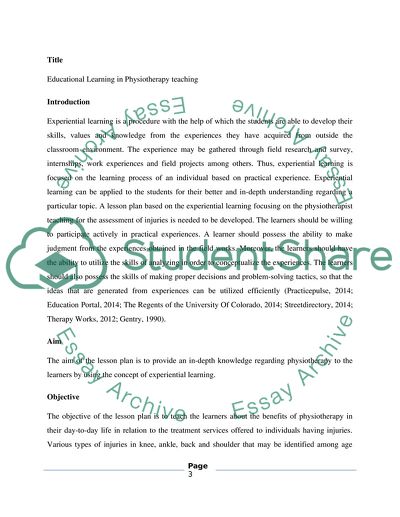Cite this document
(“Adopting one educational theory, develop a lesson plan and justify its Essay”, n.d.)
Adopting one educational theory, develop a lesson plan and justify its Essay. Retrieved from https://studentshare.org/education/1669181-adopting-one-educational-theory-develop-a-lesson-plan-and-justify-its-design-you-should-justify-the-lesson-plan-by-considering-both-theory-and-methods-of-instruction-in-relation-to-the-instructional-context-where-the-lesson-will-be-given-the-lesson-pla
Adopting one educational theory, develop a lesson plan and justify its Essay. Retrieved from https://studentshare.org/education/1669181-adopting-one-educational-theory-develop-a-lesson-plan-and-justify-its-design-you-should-justify-the-lesson-plan-by-considering-both-theory-and-methods-of-instruction-in-relation-to-the-instructional-context-where-the-lesson-will-be-given-the-lesson-pla
(Adopting One Educational Theory, Develop a Lesson Plan and Justify Its Essay)
Adopting One Educational Theory, Develop a Lesson Plan and Justify Its Essay. https://studentshare.org/education/1669181-adopting-one-educational-theory-develop-a-lesson-plan-and-justify-its-design-you-should-justify-the-lesson-plan-by-considering-both-theory-and-methods-of-instruction-in-relation-to-the-instructional-context-where-the-lesson-will-be-given-the-lesson-pla.
Adopting One Educational Theory, Develop a Lesson Plan and Justify Its Essay. https://studentshare.org/education/1669181-adopting-one-educational-theory-develop-a-lesson-plan-and-justify-its-design-you-should-justify-the-lesson-plan-by-considering-both-theory-and-methods-of-instruction-in-relation-to-the-instructional-context-where-the-lesson-will-be-given-the-lesson-pla.
“Adopting One Educational Theory, Develop a Lesson Plan and Justify Its Essay”, n.d. https://studentshare.org/education/1669181-adopting-one-educational-theory-develop-a-lesson-plan-and-justify-its-design-you-should-justify-the-lesson-plan-by-considering-both-theory-and-methods-of-instruction-in-relation-to-the-instructional-context-where-the-lesson-will-be-given-the-lesson-pla.


